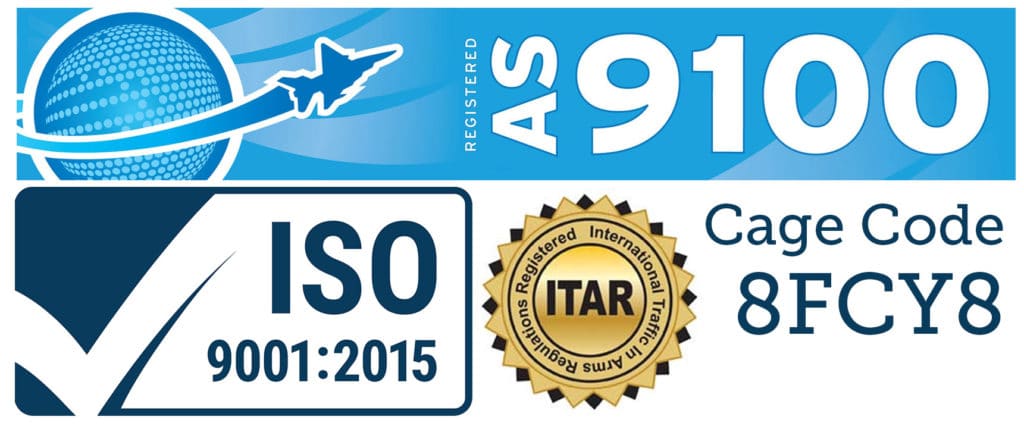Machining Refractory Metal Basics
“90% of machinists cannot machine molybdenum and harder nickel alloys. Only highly skilled machinists with the right tools and cutting oils are capable of machining materials like moly, nickel, and other specialty metals.”
When asked to machine parts made from refractory metals, there’s a good chance they’re for use in aerospace and defense, electronics, or medical device industries, though NDAs often keep machinists unaware of the end-use of the product they are producing. One thing is certain, machining these rugged materials to exacting specifications presents challenges that necessitate high-end equipment, highly skilled machinists, and experience.
The strength of tungsten, molybdenum, tantalum, niobium, and rhenium makes conventional machining techniques ineffective, resulting in rapid tool wear, poor surface finish, and dimensional inaccuracies. Moreover, their tendency to work-harden and generate excessive heat during machining exacerbates difficulties. Below we review machining equipment that will assist in your machined parts matching specification.
High-Speed Machining:
As its name suggests, high-speed machining involves operating cutting tools at significantly higher speeds and feeds. At higher speeds, the cutting forces are lowered, and less heat is generated, which means less risk of tool deflection or part distortion. This is a crucial factor for any precision-engineered part but is especially important when working on components with thin walls or made from hard metals.
- Using sharpened tools will minimize wear and heat-induced deformation and enhance surface finish quality.
- Feeding materials too quickly may cause material delamination and chipping (unwanted material removal).
Advanced Cutting Tools:
Carbide, polycrystalline diamond (PCD) and boron carbide nitrate (cBN) are popular high-end cutting tool choices.
Carbide cutting tools: Cemented carbides are a class of hard materials used extensively for cutting tools. Construction consists of fine particles of carbide cemented into a composite by a binder metal. Cemented carbides commonly use tungsten carbide (WC), titanium carbide (TiC), or tantalum carbide (TaC) as the aggregate.
- Carbide cutting tools can withstand higher temperatures at the part, leave a better surface finish, and allow for faster machining than standard high-speed steel tools.
- Carbide tools are usually superior for cutting tough materials like stainless steel.
- Carbide tools last longer than their steel tool counterparts.
Polycrystalline diamond (PCD): Using cutting tools made from ultra-hard materials such as polycrystalline diamond (PCD) can significantly improve machining efficiency and tool life when working with specialty metals. Polycrystalline diamond is manufactured in a high-pressure, high-temperature process that fuses diamond particles onto a carbide substrate, which, in turn, allows the diamond to be brazed onto a tool body.
- Tools made from PCD exhibit exceptional hardness and wear resistance, enabling them to withstand the abrasive nature of machining operations.
Boron carbide nitrate (cBN) is second in hardness to diamonds. cBN is made from grains bonded by ceramic material and offers exceptional thermal resistance and surface integrity.
- cBN is less reactive to ferrous alloys and is preferred for machining hardened (Rc up to 65) and difficult-to-machine materials such as alloy steels and nickel base superalloys.
- cBN cutting tools allow for machining at higher speeds and higher removal rates (3–5 times those of carbides) with good accuracy, finish, and surface integrity (both metallurgical integrity and residual stresses).
- cBN cutting tools are available in similar shapes and sizes as PCD tools and are a good choice for machining hardened materials.
Precision Grinding: This machining method excels at achieving and withholding tight tolerances. Precision grinding can hold tolerances as tight as 0001+/-. Grinding wheels coated with abrasive materials such as polycrystalline diamond or cubic boron nitride can effectively remove material with precision and control, and offer a superior surface finish, with a mirror-like polish. Finishes may or may not contribute to the product performance but often a highly polished finish is desirable for part esthetics.
Cutting Fluids: Cutting fluids serve as both a lubricant and coolant to reduce the risk of material chipping, thermal expansion, and chemical reactions such as oxidation during the machining process. Lubricating properties reduce friction by creating a thin layer between the chip (intended material being removed) and the tool, effectively reducing contact between them; otherwise, a build-up of chips may occur, which can interfere with precision accuracy.
Chipping, combined with speed, heat, and friction can fuse surfaces together, acting as an unwanted weld.
Adequate cooling and lubricating reduce the abrasion of the cutting tool.
Synthetic machine fluids: The biggest benefit is their high viscosity index, meaning they can retain their viscosity over a wider temperature range. They are water-based, biodegradable solutions containing organic and inorganic chemical compounds (petroleum-based oils and minerals) and a high concentration of additives, to prevent undesirable effects. Benefits include:
- Efficiently flushing chips away from the cutting zone.
- Keeping the part cool during the highest cutting speeds.
- Reducing thermal distortion, resulting in improved cutting accuracy.
- Providing higher corrosion resistance levels than traditional blends.
Vegetable-based oils are a renewable and a pollution-free alternative to conventional machining oils. Its lubricating properties stand up to friction and high temperatures, outperforming mineral oils, and because it’s stable, food-grade, and fully compatible with human skin, vegetable-based oils are well-suited for machining implanted medical devices. These oils contain long, di-polar molecules that align themselves perpendicularly and highly symmetrically along a metal surface to produce a thick and dense lubricating film that is exceptionally resilient to the pressure between the part and the cutting tool. Tight tolerances can be achieved when combined with the use of high-end carbide tools.
Trichloroethane TCE (Tricohlor) –Trichloroethane, when used correctly and with the necessary safety precautions, can be an invaluable, convenient, economical, and high-performing product. It cools by evaporation, leaves no residue, is nonflammable, and may be used as a carrier for extreme pressure additives. Without precautions, TCE is hazardous to public health and requires operators to install proper ventilation systems, since long-term exposure may cause respiratory and neurological disease. The fluid is equally toxic to the environment specifically because of its effect on the ozone. Over the years, arsenic and other hazardous ingredients have been removed from TCE, still, the fluid is banned from use in California and is restricted in other parts of the USA.
In short, refractory metals have become indispensable materials because of their exceptional heat resistance, mechanical strength, and corrosion resistance, but need to be machined by skilled operators who understand the properties and demanding requirements of these materials to ensure your part is made to spec.
Vulcan Metal Group supplies refractory and specialty metals for your application. We can also machine your parts to spec and meet your timing requirements. Find out more about CNC Milling with us or contact us directly for a quote
Address
Vulcan Metal Group LLC
23888 Madison Street
Torrance, CA 90505
United States
Phone / Fax
Phone: +1 310.882.6841
Fax: +1 310.893.0579
Cage Code
8FCY8
Quality Policy: Vulcan Metal Group, LLC. supplies mission critical, special purpose materials, and products at a competitive price. The company’s quality system is registered to ISO 9001 and AS9100 and follows its principles for the governance of the business. An active continual improvement program and compliance with all applicable OSHA, federal, and state regulations is maintained.


